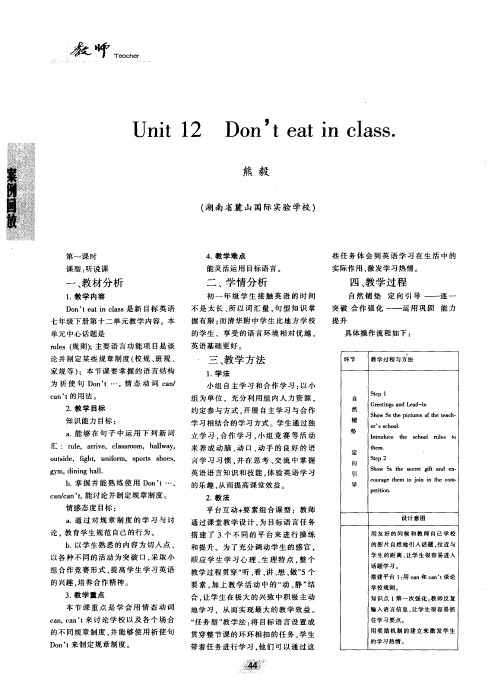Unit 12 Don’t eat in class !.13
- 格式:ppt
- 大小:1.93 MB
- 文档页数:35


Unit 12 Don’t eat in class.1.教学内容本单元标题为Don’t eat in class. 中心话题是rules。
主要语言功能项目是谈论并制定某些规章制度。
通过本单元的学习,使学生掌握祈使句,情态动词can,表示许可的用法和情态动词have to 及其各种句式的变化,能用英语表达各种标志图表的含义,学会为各种公共场所制定规章制度和使用规则,能给父母写建议信。
2.教学目标语言知识目标1)词汇:rule hallway,classroom,fight,Ms,outside,dining,hall,haveto, else,sports,shoes,gym, by, wash, later,children’s palace,no talking, loudly, fight,etc2)交际用语:can you/we eat in the classroom?Yes, we can./ No, we can’t.Don’t eat in class! Do you have to wear a uniform at school?Yes,we do./ No, we don’t. I have to do my homeworkafter school. What do you have to d o…? No talking!教学重难点:1)掌握祈使句的用法,包括表示允许的can及其情态动词用的have to,以及各种可以用语表速规章制度的动词和句型。
2)情态动词的用法,以及祈使句与它的应答。
教学设计Step1. warming upAfter greeting,teacher says:I am happy. Do you know why?Let the ss guess.Tell them: because I heard a nice song. Do you want to listen to it?Play a song.What do you think of this song?Do you like listtening to music?Can you listen to music in the classroom?Step2 presentationTake out an appleT: can I eat an aoolein class now?S: No, you can not.T: can you eat apples in class now?S:No,we can not.Repeat it with a cigarette.Step3 practiceShow the students some pictures,then let the ss talk about them with “can you/ we…?S1: can we arrive late for class?S2: No, we can not. We can not arrive late for class,Step4 GameEvery ss makes a list of six rules. Use “can” in the rules. Put the rules in a bag. And take a different set of rules out. Now find the ss who wrote these rules. Step5 listeningFinish section A 2a, 2bStep6 presentationShow the ss some pictures of the ss who are breaking school rules and ask: can we…? Present “Don’t…!Step7 matchFinfish section A 1aStep 8 listenFinish sectionA 1b, first, let the ss guess what rule Peter/ selina/ nick is breaking? Step9 CompetitionHave a competition between boys and girls: let them say as many school rules as they can.T: there are many school rules in our school.can you name any of them?S1: Don't eat in class.S2: we can’t fight…Step10. HomeworkTo sum up our school rules. To find out some signs around us and try to draw them out.。

Unit 12 Don’t eat in class. ⼀、词组 school rules 学校规章制度 break the rules 违反规章制度 in the hallways 在过道 listen to music 听⾳乐 in the music room 在⾳乐教室⾥ in the dining hall 在餐厅 sports shoes 运动鞋 gym class 体育课 after school 放学后 have to do 不得不做 too many 太多 get up 起床 by ten o’clock ⼗点之前 make dinner 做饭 the children’s palace 少年宫 ⼆、句型 (1)—Don’t arrive late for class. (2)—We can’t listen to music in the hallways,but we can listen to it outside. (3)—What else do you have to do? -- We have to clean the classroom. (4)--Can we wear hats in school? --Yes,we can/ No,we can’t. (5)-Do you have to wear a uniform at school? -Yes,we do /No,we don’t. 重难点精析 祈使句 通常⽤来表⽰命令、请求、禁⽌、建议、警告等语⽓。
它的主语you(听话⼈)通常省略。
其构成通常有以下⼏种形式。
1)Be型(即系动词原型be+表语+其他)。
如:Be quiet,please. 否定句Don’t + be+表语+其他。
如:Don’t be angry. 2)Do型(即系动词原形+宾语+其他)。
如: Open you books,please. 否定句Don’t +实义动词原形+宾语+其他。



初一英语Unit 12 Don’t eat in class. 人教新目标版【本讲教育信息】一、教学内容:Unit 12 Don’t eat in class.【具体教学内容】(一)语言功能:Talk about rules 谈论规章制度(二)目标语言:1. What are the rules at your school?Don’t run in the hallways and don’t arrive late for class.2. Can we eat in school?We can eat in the dinning hall, but we can’t eat in the classrooms.3. Can you wear hats in school?Yes, we can. / No, we can’t.4. Do you have to wear a uniform at school? Yes, we do. / No, we don’t.5. What else do you have to do ? We have to clean the classroom.(三)重点单词和词组1. in class 在课堂上(反)after classin the class 在班上,在班级上Don’t look out of the window in class. 课上不要向窗外看。
She is one of the best students in the class. 她是班上最好的学生之一。
2. fight v. 打架,争吵fight with 和……打架The two boys fought with each other yesterday. 昨天这两个男孩打了一架。
n. 打架,争吵There was a fight between the two boys yesterday.3. wash v. 洗,洗涤Wash your face clean. 把你的脸洗干净。
七年级英语下册 Unit12 Don’t eat in class导学案(无答案)人教新目标版Unit 12 Don’t eat in class. Section A(1a-2c) 课时1班级:姓名:学号:【学习目标】一、New words: rule; hallway; classroom; fight; outside; dining hall; Ms;二、Target language: 1. Don’t arrive late for class. 2. Don’t run in the hallway.3. Don’t eat in the classroom.4. Don’t listen to music in the classroom or the hallway.5. Don’t fight.三、学习祈使句的用法。
【预习内容】一、预习1a和2a,词汇翻译。
1.在课堂上吃东西2.上学迟到3.在走廊上跑4.在外面听音乐5.在餐厅里6.戴帽子二、根据首字母或汉语提示写单词。
1. There are many r in my family.2.We can’t run after others in the (走廊).3.Jim, don’t (打架)with your classmates.4. It’s snowing now. Don’t go (外面).5. All the students are sitting in the c , listening to the teacher.三、通过预习你的疑问是【课堂探究】一、Play a small game: Here are some rules that you can’t break.1. Do n’t laugh in class.2. Don’t close your eyes.3. Don’t talk to me. (Punishment: If someone breaks one of the rules, he/she has to do something.) 二、Learn the rules in 1a, read the rules. Then write the number of the rule nextto the student.三、Listening tasks: 1.Listen and write the numbers after the names.2. Listen and check the activities Alex and Cindy talk about.3. Listen and circle “can” or “can’t”.四、Pair work: Talk about the rules at your school. Then write them down.五、Main points: (知识探究)1. arrive late for= be late for 做某事迟到。